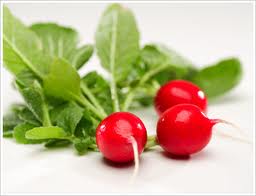A new brand – I should more accurately say, a new brand to me – reached out to us here at Truth In Aging and straight away I had a hunch that I was going to find it interesting. Sevani focuses on natural ingredients and anti-aging peptides and I will be testing their products in the coming weeks (we have enough to share, so watch out for a Dare To Try it in an upcoming newsletter). When browsing through Sevani's ingredients I immediately alighted on radish. What jumped out at me is that radish root is being used by Sevani as the sole preservative and when I did some digging into it I found that it comes with an interesting back story.
Apparently, it all started with avian flu. During the SARS epidemic, researchers in Korea found out that chickens fed kimchi had a better rate of recovery than those fed standard poultry feed. Kimchi is a traditional Korean dish made of fermented vegetables. And it seems that the ferment is a powerful anti-microbial.
Then – connecting the dots in a way that I really like – a company called
Active Micro Systems reasoned that beauty product consumers are turned off by
parabens,
phenoxyethanol and other potentially harmful preservatives and that fermented vegetables could provide an alternative. So they added leuconostoc (the same bacteria used in kimchi) to radish roots and left it to ferment. The next job was to isolate the peptide with the antimicrobial activity.
The resulting ingredient, leuconostoc/radish root ferment filtrate, seems to do a good job at 05%-2% concentrations against a whole range of tiny nasties from e.coli to a.niger and it is recommended that it can be used as the sole preservative in a cosmetic.
Leuconostoc/radish root ferment filtrate crops up in a couple of mainstream beauty products such as Peter Thomas Roth Lashes to Die For and
Elizabeth Arden Prevage Body. Although Elizabeth Arden completely defeats the object by hedging its bets by adding most parabens known to man and several other preservatives including phenoxyethanol.
Another natural preservative from AMS is made from aspen bark extract, from the quaking aspen tree found North America. Apparently, the bark is rich in salicylates that function as a defensive mechanism against invading parasites.






 Loading...
Loading...
May 7, 2012
by Frann
Hi everyone, I just jumped on board while looking for natural preservatives. Does this Leucidal really work?? I'm a newbee at making lotions and have been using: potassium sorbate, citric acid and cinnamon, along with green tea and either vit e or rosemary antioxidant oil. I'm still learning but have been selling to friends and co-workers for their feed back and they love my lotions. They have been lasting at least 2-3 months out of the refrigerator. How long of a shelf life will Leucidal give??
April 25, 2012
by Marta
Hi "Marlene" everyone is welcome to post their opinions and information that may be useful to others. However, you have attempted to post this comment under several different names. This is in violation of our code of conduct.
April 25, 2012
by Marlene Rizzo
I recently tried the new leucidal pt from formulator sample shop my testing came back and it is perfect. i used elderberry that works in my oil systems i receved an email code from them for free shipping and its code 6567 i would imagine they offfer to all their customers but i am not sure
April 18, 2012
by Gabrielle Tompson
I love using this stuff, But this article is old.. Since then they came out with a newer version that can be used in organic formulations it works in my lotions and testing came out fine - here is the link
http://www.formulatorsampleshop.com/ProductDetails.asp?ProductCode=FSSM15010
February 29, 2012
by J Hamilton
No preservative? Unless I did chemistry in mars they use Sodium benzoate I quote: has the chemical formula NaC6H5CO2; it is a widely used food preservative, with E number E211. Then there’s zinc oxide I quote dioxide has recently been classified by the International Agency for Research on Cancer (IARC) as an IARC Group 2B carcinogen ''possibly carcinogen to humans''
Then there’s AHA Fruit Acids full front page in England of the daily express for causing skin cancer
Hello anyone out there